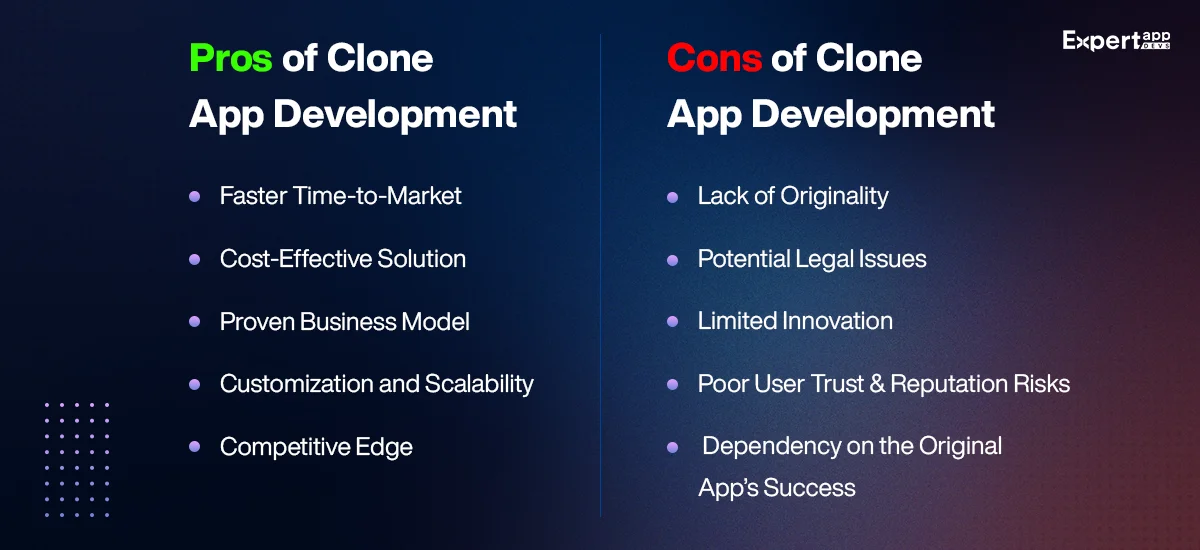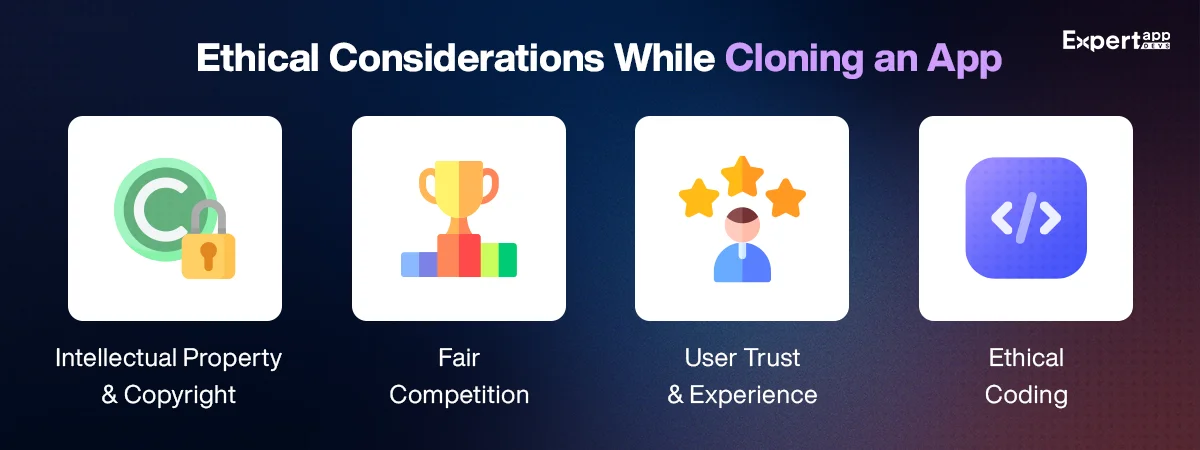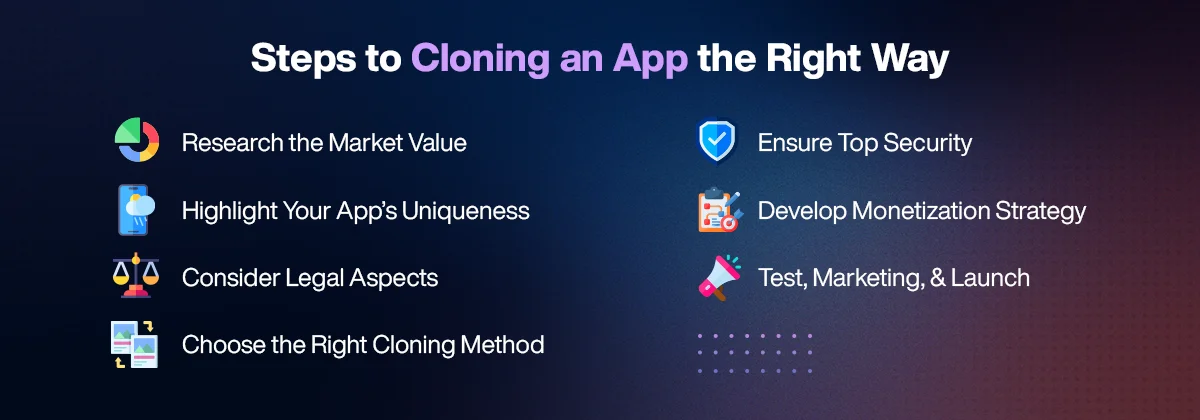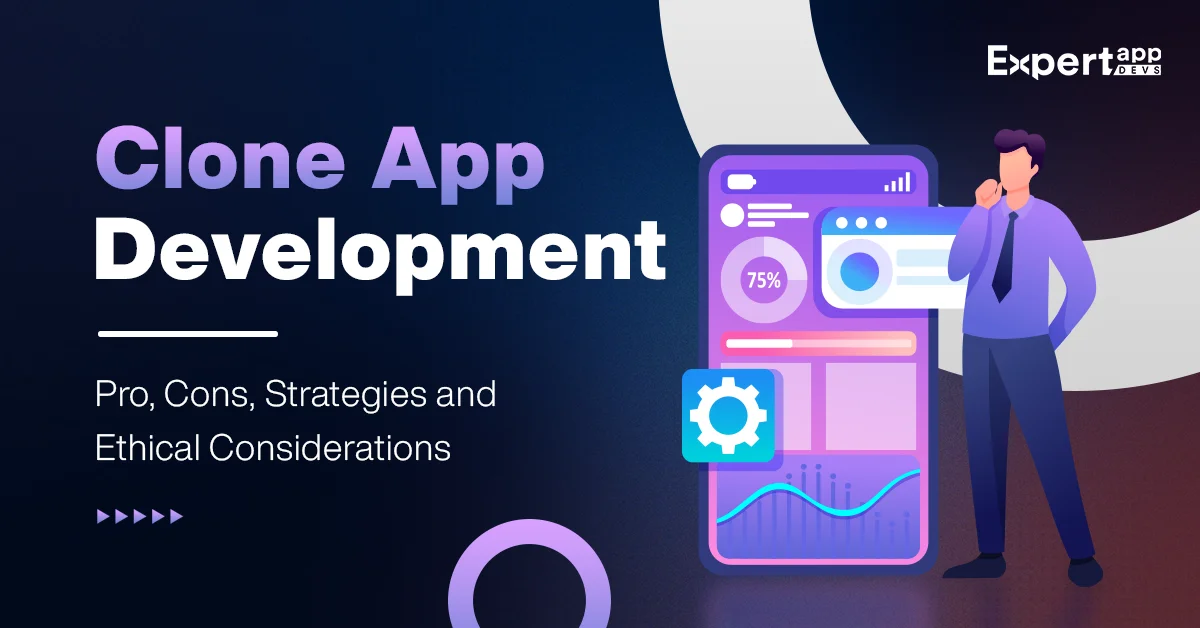Cloning Apps: Pros, Cons, Strategies, and Ethical Considerations
Due to the fast-moving market and pressure to deliver the software fast, cloning apps have become a common practice among companies. This is the easiest and most affordable approach for startups and enterprises who want to have a quick entry into the market and test their ideas with the audience. Research says cloning apps can reduce development time by up to 40%.
Today everyone wants quick software delivery, this is building up the pressure on companies and resulting in rapid application development. According to verified market research, the rapid application development market will reach up to $543.6 billion by 2030.

If you have clone project ideas and are thinking of cloning an app, read this blog till the end to explore the advantages and disadvantages of clone app development, risks, best strategies, and other things related to clone apps to execute it safely.
What is Clone App Development?
In simple words, clone means copy or duplicate. Clone app development is a process of duplicating the app with the same functionality, code, and other features from existing apps.
The clone apps are not exact copies of other apps but they can be customized by adding unique features and some designs to make it different. Business clone apps to avoid starting from scratch, and reduce development time, budget, and efforts.
The common examples are Zomato and Swiggy- they both are food delivery apps and have the same functionalities but are different.
Other than this there are a lot of use cases of successful clone apps.
Uber Clone
After the successful adoption of the Uber ride-sharing app, many transportation industries decided to clone the app and introduce their ride-sharing service to a wider audience. Some of the famous apps similar to Uber are jugnoo, rapido, and more.
Different countries have different ride-sharing apps but eventually, all serve the same purpose of booking a driver and pick and drop location, payment methods, etc.
Tinder Clone
Tinder is a popular dating app that is famous for its swipe-right and swipe-left concept. As today's teenage generation mostly prefers to find people online, dating apps demand is on the sky. Bumble and Hinge are apps similar to Tinder, they might have different functionalities but overall features are the same.
Whatsapp and Telegram Clone
WhatsApp is now used at every corner of the earth. Seeing the success, the clone app Telegram got launched with similar chatting, and calling features but added some privacy like private chat features, sharing big files, stickers, etc.
And the market is full of clone apps if you look around yourself. You may also wonder that you also might be using the majority of these like Urban Clap, Instagram, Snapchat, Fiverr, Upwork, Paytm, Venmo, and many more.
Why Clone Applications Are Getting Popular?
Clone applications are loved and used by most companies for a number of reasons.
- You don't have to search for app ideas and go for detailed research, analysis, and validation phases.
- Your developers won't have to write every line of code from scratch.
- As clone scripts are thoroughly tested before launched, you can assure quality and trust them by looking at their user and insights.
- It is an affordable option for a startup that is tight on budget and wants to enter the app market quickly.
- People are most likely to use clone apps because of familiarity with features and proven concepts.

Pros of Clone App Development
You should know the pros and cons of cloning the app before you clone the app or work on any clone website project ideas.
#1. Faster Time-to-Market
You can quickly replicate any successful app and customize it according to the latest user needs and market trends. As the app was already in the market, users will be already familiar with the app's use and features hence you can launch quickly and have a special place in a competitive market.
Overall it's perfect for startups because it saves months of development time.
#2. Cost-Effective Solution
Cloning apps reduces the overall cost of development because the core framework is already ready, and developers don't need to write code from scratch. Also design, testing and everything is tested by QA experts previously, so this also saves the cost of testing and half the development cost.
#3. Proven Business Model
You will obviously mimic the app that is running successfully in the market. The majority of app failure comes from poor app ideas. But with clone apps, you are sure to get success in the competitive market because you replicate the app with a proven business idea. As the concept is already tested, users adapt the clone apps faster than a newly launched app.
#4. Customization and Scalability
The Clone app is not just about copying but it allows to customize and add features and functionality according to current user demands. You can research about the current user problems and add useful and unique features to the clone app.
#5. Competitive Edge
In this competitive edge, building an app and launching quickly is a time-consuming task. But with clone apps, you can create a refined app for the less developed market and bring a totally new concept to the market.
Cons of Clone App Development
No doubt clone apps come with lots of benefits but they do have some drawbacks. Here are they:
#1. Lack of Originality
It is said that” you can copy the idea but not the essence” Every idea has its uniqueness and essence. When you clone the app, the audience sees it as a copy. Your app got a tag or recognition, this is an app similar to this. Also, this limits your team’s creativity and may not create your unique brand identity whom you can proudly call yours.
#2. Potential Legal Issues
Clone apps can lead to legal issues if it is very much the same as existing apps. Hence you need to clone it smartly so that specific features, designs, or things don't exactly look similar to other apps in the market. Otherwise, this can lead to legal disputes and you may get punished for copyright and intellectual property violation.
#3. Limited Innovation
There is a lot of difference between an app that is made with detailed research and fresh ideas and a clone app that is just replicated from an existing one. Also, this prevents your team’s creativity from exploring new ideas and limits your growth.
#4. Poor User Trust and Reputation Risks
Do you know that 55% of people directly gets impacted by a negative reputation? Cloning apps may create a poor impression of your brand and harm your long-term success.
Plus, users who have already used the original app might not find your app valuable and see you as a copycat.
#5. Dependency on the Original App’s Success
When you clone the app, your business success will totally depend on the original app. If due to some reason, the original apps got negative reviews or performance issues, users will also think the same for you that your app might also be like this.
Eventually, high market saturation will impact your business profit negatively.
Strategic Considerations for C-Level Executives
| Clone App Development Strategic Considerations | |
|---|---|
| Strategic Consideration | Key Factors |
| Business Goals and ROI | - Revenue, Market Expansion, or Operational Efficiency - Alignment with Your Business Model and Long-Term Goals - Conduct a Cost-Benefit Analysis - Focus on Unique Value Propositions, KPI |
| Market Analysis | - Conduct Demand and Competitor Analysis - Analyze Pricing Strategies - Research Trends and User Behavior - Analyze Pricing Strategies |
| Legal and Compliance | - Intellectual Property (IP) Rights - Data Privacy Laws - Licensing Requirements - Consult Legal Experts |
| Long-Term Vision | - Focus on Scalability - Use Robust Tech Stack - Develop a Continuous Improvement Strategy - Plan for Future Updates - Explore Monetization Models and Partnerships |
What Are The Ethical Considerations That You Must Consider While Cloning An App?
Clone apps can be proven good for you if everything is done legally and by considering ethical aspects. Below are some of the important points you must consider if you are cloning an app.

#1. Intellectual Property & Copyright
The person who owns the app has put so much effort and money into developing the app with fresh ideas hence if you clone the app without permission and avoid intellectual property copyrights then you are punishable. Because the previous app may contain sensitive or important information regarding the business and if any crime happens, you are in trouble.
#2. Fair Competition
You must clone the app to refine and create something useful or much better from the existing ones. If you are cloning apps selfishly for your business profit then it's not a fair deal.
#3. User Trust & Experience
Users prefer authenticity and clone apps might struggle to give you that value and trust from the user’s side. Be transparent and add useful features in the app that solve users’ problems. If you are cloning an app to solve users problems then you will definitely get a positive image.
#4. Ethical Coding
No one will like it if you steal their app idea or copy it completely. Hence doing everything in an ethical and legal manner is very important. Use clean and secure coding practices to strengthen your app's reputation.
Cost of Creating The Clone App
The primary factor of the cost of creating a clone app is the uniqueness you are adding. The more unique features and functionalities you add, the cost will go up accordingly. Other than this Cost depends on factors like Complexity, development team location, development approach used, features set, maintenance, and marketing.
- Simple clone app costs: $10,000 – $25,000
- Moderate complexity clone app: $25,000 – $55,000
- Complex clone app: $55,000 – $200,000+
How to Clone an App the Right Way?
Cloning apps is not about how smart you copy, it's about how better you use existing successful apps for better market-ready solutions. If you have decided to clone the app, follow the below guide to clone it in the right manner and get the most from it.

Step 1. Research The Market Value
Before cloning the app, research the market value, current trends, and competition. Find the pain points and gaps and how you can offer something better. Your clone app might be a copy of something but if it solves real-users problems, it can sustain in the market.
Step 2. Highlight Your App’s Uniqueness
Show modifications and enhancements your clone app has. It should not be an exact replica. Invest money in making the clone app far better than the existing ones. Like adding better designs for user experience, useful features, and more.
Step 3. Consider Legal Aspects
Go through legal guidelines, and intellectual property laws before clone app development. You should not copy branding elements and code like their personal tagline, etc.
Pro tip: Just take inspiration from the app, don’t fully copy.
Step 4. Choose The Right Cloning Method
Decide between using pre-built templates, third-party cloning software, or custom development. Practically, there is a specific right method for cloning because it depends on your budget, timeline, and the complexity of your desired app.
Pro tip: if you don't have the budget for custom apps, making custom-built clones offers better flexibility and scalability.
Step 5. Ensure Top Security
When you clone apps, it might come with certain things that might break your current security. Security should never be compromised in cloned apps so use data encryption, secure authentication, privacy measures to protect users' personal information, and whatever you implement, just make sure your clone app is 100% secure because it's a matter of trust.
Step 6. Develop Monetization Strategy
Your monetization strategy must be different from the original one. To earn user's trust, you can provide free service to new users so that they can explore and see the uniqueness of your app. And then add premium through ads, subscriptions, in-app purchases, or whatever is convenient for you.
Step 7. Test, Marketing, And Launch
No doubt, the original app is tested but to be double sure, you must test your app thoroughly again before marketing or launching it.
Pro tip: Highlight your app’s unique features during marketing, this creates a good impression.
Conclusion
Hope now you have a clear idea to compare the pros and cons of clone apps. Cloning apps is not bad if it is used ethically, creatively, uniquely, and legally. It's all about how you create a balance between all costs, speed, and innovation. In the end app uniqueness and quality is always valued. So don't hesitate to spend money in integrating new technologies and unique features in clone apps.
Frequently Asked Questions
#1. Is It Legal To Develop Clone Applications?
Yes, it is legal to clone applications as long as you are not using the copyrighted code, trademarks, or other intellectual property. But you need to make your app unique with different designs, features, and functionality.
#2. Why Do Businesses Clone Apps?
Every business has its own reasons for cloning apps. They usually clone apps to enter the market fast. Businesses also clone apps because of a lack of budget, and time or who don't have technical knowledge to code from scratch.
#3. How Do I Detect Clone Apps?
Clone apps can be easily detected by checking app store reviews, developer details, official websites, etc. Also check for design similarities, identical features, unusual code signatures, and permissions.
#4. What Are The Risks of Cloning an App?
There are many risks of cloning an app if it's not done legally and ethically. Firstly you need to make it unique as much as you can. Below are some risks of cloning an app, you must be aware of this.
- Potential damage to the original app's reputation.
- Copyright and intellectual property violations.
- Your app lacks originality essence.
- User trust and other concerns.
- Market saturation and dependency.
#5. How Can I Make My Cloned App Unique?
You can make even a copied app unique by deep brainstorming and creativity. Below are some ways, how you can do it.
- Add distinct features by researching your niche and user needs.
- Integrate the latest technologies that existing apps don't have.
- Branding your app uniquely makes it unique from existing ones.
- Change design, color schemes, and other things.
- Add unique things like AR/VR, social features, customer support, etc to make the app worthy.
#6. What Technology Stack Is Best For Cloning An App?
It depends on the existing apps’ functionality and the platform it was built on. But if you are cloning an app, using Node.js with Express.js, react, vue.js, etc are the better choices of technologies you can go with.
#7. Should I Build A Cloned App Or Develop A Unique One From Scratch?
It depends on your business and the goal you are trying to achieve. Clone apps are like shortcuts for faster success that might not give the expected results. But with custom apps, you are totally involved throughout the development and know every part of the app. You put your time, sweat, and effort into choosing technologies, designs, etc.
In short, if you want to have a good impression and have long-lasting growth, develop from scratch. Schedule a consultation call with us to know how we can help you with custom app development.
#8. How Can I Legally Protect My Cloned App?
Clone apps usually come with some risks but you can legally protect them by following ways.
- Create your own patent with unique functionalities.
- Copyright your logo, app name, source code, design elements, and necessary parts of the app.
- Sign an NDA if you are outsourcing clone app development to other developers.
 Jignen Pandya
Jignen Pandya




